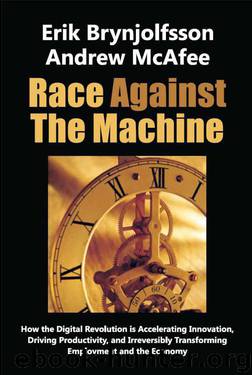Race Against The Machine: How the Digital Revolution is Accelerating Innovation, Driving Productivity, and Irreversibly Transforming Employment and the Economy by Brynjolfsson Erik & McAfee Andrew

Author:Brynjolfsson, Erik & McAfee, Andrew [McAfee, Andrew]
Language: eng
Format: epub
Publisher: Digital Frontier Press
Published: 2011-10-16T22:00:00+00:00
According to the recently updated data from the U.S. Commerce Department, recent corporate profits accounted for 23.8% of total domestic corporate income, a record high share that is more than 1 full percentage point above the previous record. Similarly, corporate profits as a share of GDP are at 50-year highs. Meanwhile, compensation to labor in all forms, including wages and benefits, is at a 50-year low. Capital is getting a bigger share of the pie, relative to labor.
The recession exacerbated this trend, but it’s part of long-term change in the economy. As noted by economists Susan Fleck, John Glaser, and Shawn Sprague, the trend line for labor’s share of GDP was essentially flat between 1974 and 1983 but has been falling since then. When one thinks about the workers in places like Foxconn’s factory being replaced by labor-saving robots, it’s easy to imagine a technology-driven story for why the relative shares of income might be changing.
It’s important to note that the “labor” share in the Bureau of Labor Statistics’ data includes wages paid to CEOs, finance professionals, professional athletes, and other “superstars” discussed above. In this sense, the declining labor share understates how badly the median worker has fared. It may also understate the division of income between capital and labor, insofar as CEOs and other top executives may have bargaining power to capture some of the “capital’s share” that would otherwise accrue to owners of common stock.
Inequality Can Affect the Overall Size of the Economy
Technology changes the shares of income for the skilled vs. unskilled, for superstars vs. the rest, and for capital vs. labor. Is this simply a zero-sum game where the losses of some are exactly offset by gains to others? Not necessarily. On the positive side of the ledger, inequality can provide beneficial incentives for skill acquisition, efforts toward superstardom, or capital accumulation. However, there are also several ways it can hurt economic well-being.
First, one of the most basic regularities of economics is the declining marginal utility of income. A $1,000 windfall is likely to increase your happiness, or utility, less if you already have $10 million than if you only have $10,000. Second, equality of opportunity is important to the efficiency and fairness of a society, even if unequal outcomes are tolerated or even celebrated. Equality of opportunity, however, can be harder to achieve if children of poverty get inadequate health care, nutrition, or education, or people at the bottom are otherwise unable to compete on a level-playing field. Third, inequality inevitably affects politics, and this can be damaging and destabilizing. As economist Daron Acemoglu puts it:
Economic power tends to beget political power even in democratic and pluralistic societies. In the United States, this tends to work through campaign contributions and access to politicians that wealth and money tend to buy. This political channel implies another, potentially more powerful and distortionary link between inequality and a non-level playing field.
Download
This site does not store any files on its server. We only index and link to content provided by other sites. Please contact the content providers to delete copyright contents if any and email us, we'll remove relevant links or contents immediately.
International Integration of the Brazilian Economy by Elias C. Grivoyannis(111059)
The Radium Girls by Kate Moore(12028)
Turbulence by E. J. Noyes(8049)
Nudge - Improving Decisions about Health, Wealth, and Happiness by Thaler Sunstein(7706)
The Black Swan by Nassim Nicholas Taleb(7129)
Rich Dad Poor Dad by Robert T. Kiyosaki(6632)
Pioneering Portfolio Management by David F. Swensen(6300)
Man-made Catastrophes and Risk Information Concealment by Dmitry Chernov & Didier Sornette(6019)
Zero to One by Peter Thiel(5802)
Secrecy World by Jake Bernstein(4753)
Millionaire: The Philanderer, Gambler, and Duelist Who Invented Modern Finance by Janet Gleeson(4478)
The Age of Surveillance Capitalism by Shoshana Zuboff(4292)
Skin in the Game by Nassim Nicholas Taleb(4248)
The Money Culture by Michael Lewis(4207)
Bullshit Jobs by David Graeber(4190)
Skin in the Game: Hidden Asymmetries in Daily Life by Nassim Nicholas Taleb(4006)
The Dhandho Investor by Mohnish Pabrai(3764)
The Wisdom of Finance by Mihir Desai(3747)
Blockchain Basics by Daniel Drescher(3582)
